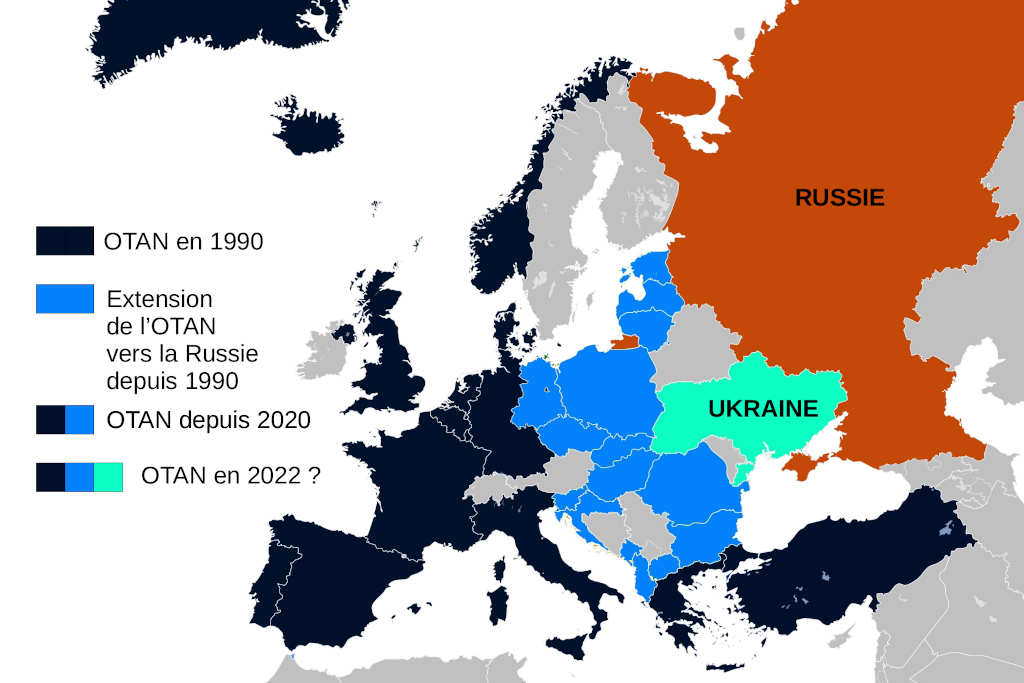Crisis in Ukraine: NATO’s non-extension commitment beyond Germany confirmed by declassified archives
NATO gave Vladimir Putin an important argument to justify the military offensive in Ukraine to Russian public opinion
Sunday, February 27, 2022
An article published on December 12, 2017 by the “National Security Archives” confirms the assurances given by the United States and its European allies as to the refusal to extend NATO beyond the borders of Germany, in exchange for the agreement by the Soviet Union to the reunification of Germany in 1991. These assurances were not kept and NATO expanded to the borders of Russia, encompassing not only the former Warsaw Pact states , but also former Soviet Socialist Republics. It is then obvious that supporting Ukraine’s accession to NATO was the straw that broke the camel’s back, giving Vladimir Putin an argument justifying the military offensive with Russian public opinion.
US Secretary of State James Baker’s famous “not an inch east” phrase regarding NATO expansion during his meeting with Soviet leader Mikhail Gorbachev on February 9, 1990 was part of a cascade of assurances of Soviet security given by Western leaders to Gorbachev and other Soviet leaders. officials throughout the German unification process in 1990 and until 1991, according to declassified American, Soviet, German, British and French documents released December 12, 2017 by the George Washington University National Security Archive.
The documents show that several state leaders considered and rejected the accession of Central and Eastern Europe to NATO from the beginning of 1990 and until 1991, that the discussions on NATO in the context of the negotiations of German unification in 1990 was not at all strictly limited to the status of the former GDR, and that later Soviet and Russian complaints about being misled about NATO expansion were based on memoranda and cables written at the highest levels.
Leave East German territory out of NATO military structures
The first concrete assurances from Western leaders about NATO began on January 31, 1990, when West German Foreign Minister Hans-Dietrich Genscher gave a major public speech in Tutzing, Bavaria, on German unification. The United States Embassy in Bonn informed Washington that Genscher had made it clear “that the changes in Eastern Europe and the process of German unification must not lead to harm to Soviet security interests”. Therefore, NATO should rule out an “eastward expansion of its territory, that is, bringing it closer to the Soviet borders.” The Bonn cable also noted Genscher’s proposal to keep East German territory out of NATO’s military structures,
The “Tutzing formula” immediately became the focus of a flurry of significant diplomatic discussions over the next 10 days in 1990, leading to the crucial February 10, 1990 meeting in Moscow between Kohl and Gorbachev when the West German leader secured Soviet assent in principle to German unification in NATO, as long as NATO did not expand eastward. The Soviets would then have needed time to convince their public opinion (and obtain financial assistance from the West Germans) before officially signing the agreement in September 1990.
It is not possible to leave the Warsaw Pact to join NATO
Conversations before Kohl’s assurance involved an explicit discussion of NATO expansion, Central and Eastern European countries, and how to convince the Soviets to accept unification. For example, on February 6, 1990, when Genscher met with British Foreign Secretary Douglas Hurd, the British record showed that Genscher said: “The Russians must have some assurance that if, for example, the Polish government ever left the Pact Warsaw, they would not join NATO the next day”.
Not once, but three times, Baker used the phrase “not an inch to the east” with Gorbachev at the February 9, 1990 meeting. He agreed with Gorbachev’s statement in response to assurances that “the enlargement of NATO is unacceptable. Baker assured Gorbachev that “neither the President nor I intend to derive unilateral advantages from the ongoing processes”, and that the Americans understood that “not only for the Soviet Union, but also for the other European countries, it is important to have guaranteed that if the United States maintains its presence in Germany within the framework of NATO, not an inch of the current military jurisdiction of NATO will extend to the East” .
| Commentary: United States commitments contradicted by the facts But a few years later, taking advantage of the destruction of the USSR, NATO’s eastward enlargement process began. It now includes all former member states of the Warsaw Pact. Added to this are Albania, four states resulting from the destruction of Yugoslavia (Slovenia, Croatia, Montenegro and North Macedonia) and three former Soviet socialist republics (Lithuania, Latvia and Estonia) directly bordering Russia. It is then obvious that supporting Ukraine’s accession to NATO was the straw that broke the camel’s back, giving Vladimir Putin an argument justifying the military offensive with Russian public opinion. |

Posted on March 3, 2022
0